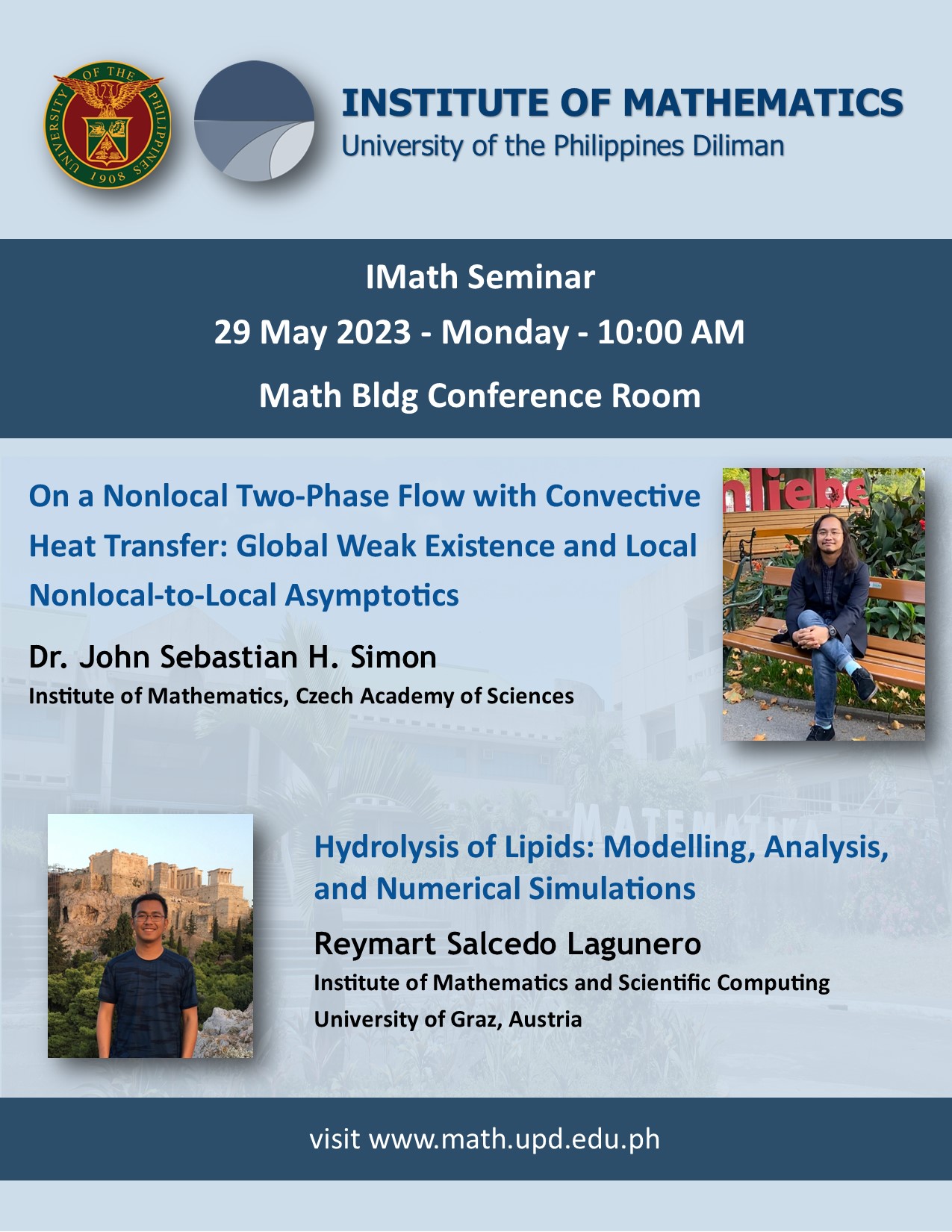IMath Seminar: Dr. John Sebastian Simon and Reymart Salcedo Lagunero

You are all invited to a seminar featuring talks from two visiting researchers: Dr. John Sebastian H. Simon and Mr. Reymart Salcedo Lagunero. This is an in-person event and it will be held on Monday, May 29, 2023, 10:00 AM at the Math Building Conference Room.
Dr. John Sebastian H. Simon (Institute of Mathematics, Czech Academy of Sciences)
Title: On a Nonlocal Two-Phase Flow with Convective Heat Transfer: Global Weak Existence and Local Nonlocal-to-Local Asymptotics
Abstract: In this talk we study a system describing the dynamics of a two-phase flow of incompressible viscous fluids influenced by convective heat transfer of Caginalp-type. The separation of the fluids is expressed by the order parameter which is of diffuse interface and is known as the Cahn-Hilliard model. We shall consider a nonlocal version of the Cahn-Hilliard model which replaces the gradient term in the free energy functional into a spatial convolution operator acting on the order parameter and incorporate with it a potential that is assumed to satisfy an arbitrary polynomial growth. The order parameter is influenced by the fluid velocity by means of convection, the temperature affects the interface via a modification of the Landau-Ginzburg free energy. The fluid is governed by the Navier-Stokes equations which is affected by the order parameter and the temperature by virtue of the capillarity between the two fluids. The temperature on the other hand satisfies a parabolic equation that considers latent heat due to phase transition and is influenced by the fluid via convection. The goal is to show the global existence of weak solutions and show that, for an appropriate choice of sequence of convolutional kernels, the solutions of the nonlocal system converges to its local version.
Reymart Salcedo Lagunero (Institute of Mathematics and Scientific Computing, University of Graz, Austria)
Title: Hydrolysis of Lipids: Modelling, Analysis, and Numerical Simulations
Abstract: Triglycerides (TGs) are fat molecules in our body that comes from the foods we consume or excess calories that are stored as lipid droplets in the white adipose tissues of the body. It is composed of a glycerol backbone and three attached chains of fatty acids. Lipid hydrolysis, also known as lipolysis, is the splitting of ester bonds in TGs by the addition of water producing the fundamental components fatty acids (FAs) and a glycerol backbone. During times of starvation or high energy-consuming activities, our bodies convert these TGs from lipid droplets via lipolysis and produces the FAs that are necessary for the production of adenosine triphosphate, a source of cellular energy in the body. In white adipose tissues, the process of degrading TGs into glycerol and free FAs involves a coordinated process catalyzed by three different enzymes.
In this talk, we study a numerical test case model that describes the evolution of substrate concentration in lipolysis. In particular, we propose a complex balance chemical network for which an explicit and non-negative stationary state solution can be computed. Hence, we prove the unique solvability of the model and show the exponential convergence of the solution to the equilibrium state using the so called entropy method. Finally, we present numerical simulations to demonstrate our results.
